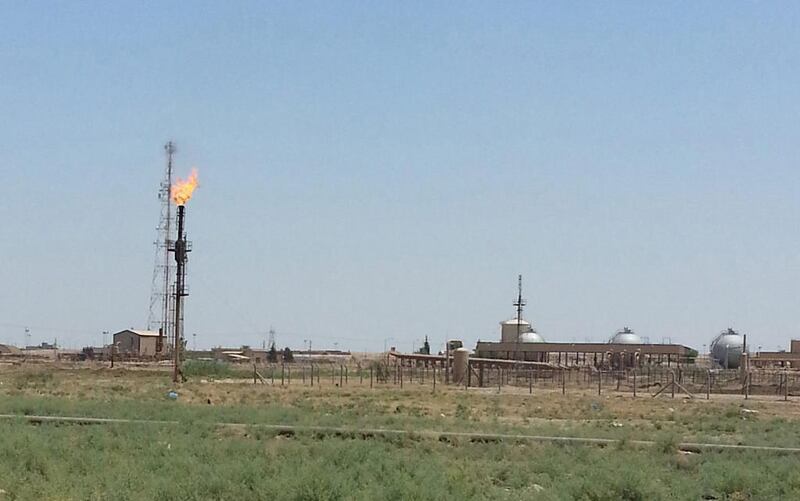BAGHDAD/KIRKUK // Kurdish forces seized two oilfields in north Iraq on Friday and took over operations from a state-run oil company.
The seizure came as Kurdish politicians formally withdrew from the prime minister Nouri Al Maliki’s government.
The moves escalated a feud between the Shiite-led central government and the autonomous Kurdish region driven by a Sunni insurgency which threatens to fragment Iraq on sectarian and ethnic lines three years after the withdrawal of US forces.
The Kurdish forces took over production facilities at the Bai Hassan and Kirkuk oilfields near Kirkuk, the oil ministry in Baghdad, sources at state-run Northern Oil Company and a senior source in the Kurdistan Regional Government (KRG).
The oil ministry called on the Kurds to withdraw immediately to avoid “dire consequences”.
Kurdish forces took control of nearby Kirkuk a month ago after Iraqi armed forces withdrew in the face of a lightning assault by Islamic State militants, who have seized large parts of north and west Iraq.
The two oilfields have a combined production capacity of 450,000 barrels per day, but have not been producing significant volumes since March when Baghdad’s Kirkuk-Ceyhan export pipeline was sabotaged.
Efforts to reach agreement on a new government in Baghdad to confront the insurgents have been complicated by the rising tensions between Mt Al Maliki and the Kurds.
The national parliament elected in April met for the first time last week. The United States, the United Nations and Iraq’s own Shiite clerics have urged lawmakers to form a new government to face the Sunni insurgency quickly.
Parliament’s first session ended without agreement over the nominations for the top three government posts. The second was to be held on Tuesday but was delayed until Sunday.
Massoud Barzani, the regional Kurdish president, last week told his parliament in Erbil to prepare a referendum on independence, infuriating Mr Al Maliki.
The relationship hit a new low this week when the prime minister accused Kurds of allowing their capital to be used as a base for Islamic State and others, including former members of Saddam Hussein’s now-banned Baath party.
In protest against the accusation, the Kurdish political bloc announced their full withdrawal from the Baghdad government on Friday.
The foreign minister, Hoshyar Zebari, said the Kurds will continue to attend parliament.
Mr Zebari, who is a Kurd, said Iraq risked falling apart if a new inclusive government is not formed soon as “the country is now divided literally into three states - “Kurdish, a black state (Islamic State) and Baghdad”.
He urged Iraq’s political blocs to form a government quickly and build a federal Iraq.
Unless Iraqi leaders rose to the challenge “the consequences are very dire: complete fragmentation and failure” of the country, he said.
A spokesman for Mr Barzani described Mr Al Maliki, who is seeking a third term in office in the face of considerable political opposition, “has been afflicted by a true hysteria”.
The increasingly bitter political accusations prompted the country’s top Shiite cleric on Friday to urge Iraq’s leaders to end their bickering and for fighters to respect all Iraqis regardless of sect or ethnicity.
“We have repeatedly called for the closing of ranks and for unity and to refrain from radical discourse,” Ayatollah Ali Sistani said in a sermon delivered by an aide.
Sectarian rhetoric from politicians had already incited Iraqis and such discourse would only destabilise things further, he said.
Tens of thousands of people responded to a call from Ayatollah Sistani on June 13 to take up arms against the Sunni insurgency.
“We would like to stress to all our armed forces and those volunteers who have joined them ... the necessity of strict and full commitment in taking care of the rights of all the people,” the aide Abdul Mehdi Al Karbalai told worshippers at the Imam Hussein shrine in the Shiite holy city of Karbala.
Fighters should “not ... transgress against any innocent citizen no matter their sectarian or ethnic affiliation or whatever their political stance”.
A senior Iraqi Shiite politician said that in the first week after Ayatollah Sistani’s call, Sunni citizens were killed by militia that had quickly mobilised. They had now been brought under control.
But Sunnis continue to speak of relatives being taken away by security forces and militias and disappearing. Two days ago, 53 corpses, blindfolded and handcuffed, were found south of Baghdad.
Meanwhile on Friday, Islamic State militants launched an offensive near Ramadi, the capital of Anbar province, killing 11 police and wounding 24 in clashes with the security forces.
The militants have captured several areas west of the city since the fighting broke out Thursday afternoon, while also seizing one police station and blowing up a second.
* Reuters with additional reporting by Agence France-Presse





